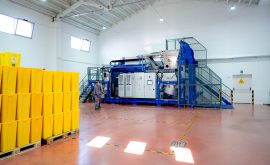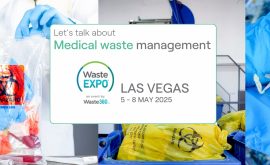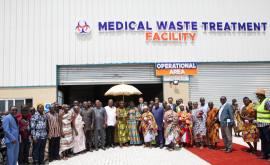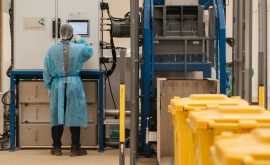Medical waste are a resource
Valorizing disinfected medical waste: it’s possible

Although often perceived as a burden, medical waste can actually be a valuable resource when properly managed and valorized. Its composition generally contains highly sought-after materials with specific recycling potential, making it highly attractive to the plastics and recycling industries. Sorting this waste efficiently can therefore be highly both environmentally and financially beneficial.
To facilitate this, Ecosteryl has developed a process that is unique worldwide: R-Steryl sorting center. Combined with Ecosteryl’s range of machines, this highly efficient sorting center enables the separation of processed medical waste for the valorization of its different fractions. Beyond the ecological and environmental benefits, investing in a sorting solution can also be highly profitable, creating a new source of revenue.
Envision a disinfected medical waste turning into an everyday object such as a lamp, a vase, or urban furniture, or even forming the base of a new waste bin. This scenario is not only entirely conceivable but also actively encouraged within a sustainability and circular economy framework. Disinfected medical waste—primarily composed of plastics—can have a valuable second life.
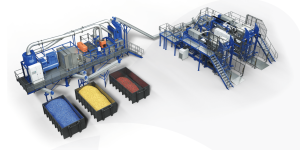 Transforming waste from an ignored byproduct into a valuable resource requires only a ‘technological’ step, which Ecosteryl enables with its sorting center. By combining aeraulic and optical sorting processes, R-Steryl extracts high-purity materials from medical waste streams, maximizing both efficiency and profitability.
Transforming waste from an ignored byproduct into a valuable resource requires only a ‘technological’ step, which Ecosteryl enables with its sorting center. By combining aeraulic and optical sorting processes, R-Steryl extracts high-purity materials from medical waste streams, maximizing both efficiency and profitability.
• Reduce landfill and incineration costs
- Polypropylene (PP)
- Polyethylene (PE)
- Polyvinyl chloride (PVC)
- Polycarbonate (PC)
- Acrylonitrile-butadiene-styrene (ABS)
- Expanded Polystyrene (EPS)
- Paper and cardboard
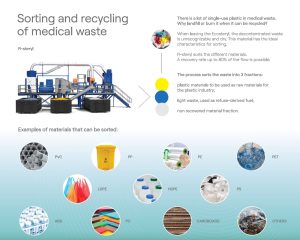 The selected plastic polymer, or a blend of selected polymers, can be used in various production processes, including but not limited to:
The selected plastic polymer, or a blend of selected polymers, can be used in various production processes, including but not limited to:
- Manufacturing plastic tubes and pipes for irrigation and electrical applications
- Producing plastic containers and bottles
- Manufacturing waste bins
- Packaging materials
- Textile industry applications
- Manufacturing benches, chairs, and various furniture items
Sorting fractions and valuation
R-Steryl separates waste into three main fractions, each with a specific valuation:
1. Light fraction:
Composed of light plastic films, cotton, and textiles, the light fraction can be reused as Solid Recovered Fuel (SRF). This process converts non-hazardous dry waste into an energy source. Due to its high calorific value, SRF is highly valued by industries with high-capacity furnaces, such as cement manufacturers.
Consisting of dense plastics (PET, PE, PP, PVC), syringes, and needles, this fraction is further divided into:
-
-
This fraction is sorted by selecting specific materials or a mixture of materials, with the possibility of specifying colors and sizes. The sorted plastic fraction is chosen based on the initial nature of the waste.
-
For example, only yellow PP under 3 cm may be selected.
Recovered materials are reused as raw materials in various recycling industry processes.
-
- This fraction may either be discarded in a landfill or re-sorted. It can be recirculated within the R-Steryl system or processed further using multiple optical sorters. Alternatively, it can be sent to specialized sorting centers for additional treatment.
Aeraulic and optical sorting system
How does this work? By combining aeraulic separation and an optical sorting system, R-Steryl separates disinfected medical waste based on density, material type, color, and size, achieving unparalleled levels of efficiency and purity.
 Aeraulic Separation: This system separates materials based on density differences between light and heavy components. Using a zigzag screen, a fan, and a cyclone, it recovers the light fraction while enhancing the quality of the heavy fraction, which is then sorted by the optical sorter.
Aeraulic Separation: This system separates materials based on density differences between light and heavy components. Using a zigzag screen, a fan, and a cyclone, it recovers the light fraction while enhancing the quality of the heavy fraction, which is then sorted by the optical sorter.
Optical Sorting: This system combines two types of sensors to recognize and separate selected materials. Once identified, the targeted plastic is ejected via an ejection module, enabling its recovery as a positive fraction for recycling.
Defining market value
As mentioned, the resale of disinfected and sorted medical waste can be a highly viable business. But what determines the market value of these sorted and valorized materials? The selling price depends primarily on:
- Waste specificity
- Industry demand
- Specific tests to determine profitability
Ecosteryl’s expertise and support
 If you are considering adopting R-Steryl, Ecosteryl’s expert team is available to provide guidance and support, including:
If you are considering adopting R-Steryl, Ecosteryl’s expert team is available to provide guidance and support, including:
- Analyzing waste composition through laboratory tests at specialized research centers in Belgium.
- Conducting trials with processed waste at our Ecosteryl R&D center.
This expertise helps to identify the most valuable fractions to sort and sell in the local market, depending on waste composition and characteristics. To further optimize this process, we recommend reaching out to plastic manufacturers and industries that use plastic materials in your region. This will help determine:
- The required level of purity
- The degree of selectivity needed for optimal plastic valorization
Towards a circular and sustainable economy
Need more information or want to contact an Ecosteryl expert?
Email us at sales@ecosteryl.com

